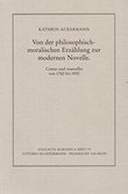Explore

Von der philosophisch-moralischen Erzählung zur modernen Novelle
Kathrin Ackermann
2004
Die Arbeit untersucht die Vorgeschichte der modernen französischen Novelle, die ab 1829 ein neues Paradigma in der Gattungsgeschichte der Kurznarrativik bildet. Entgegen der Behauptung, die Novellen Mérimées, Stendhals u. Balzacs hätten nichts mit den Erzählungen des 18. u. frühen 19. Jh. zu tun, wird gezeigt, daß letztere das Arsenal für die Erneuerung der Gattung um 1830 bereitsstellen.Ausgangspunkt der Entwicklung ist ein relativ stabiles Gattungsbewußtsein, das bis Mitte der 1760er Jahre klar zwischen conte u. nouvelle unterscheidet. Diese Opposition beginnt sich mit der Erfolgswelle des conte moral aufzulösen, da dieser in das Feld der nouvelle übertritt, so daß die Gattungsbezeichnungen conte und nouvelle ihre distinktive Kraft einbüßen. Die beiden beliebtesten Themen des conte moral, die Eheanbahnung und die Erziehung, manifestieren sich in einer Reihe textueller Strategien, die trotz der veränderten gesellschaftlichen Bedingungen bis in die ersten beiden Jahrzehnte des 19. Jh. überdauern, was in der Regel mit Verzerrungen, Parodie-rung und Afunktionalität der verwendeten Erzählmuster einhergeht. Zeitgleich zu diesen systemerhaltenden Transformationen lassen sich bei Autoren wie Diderot, Mme de Staël, Sade und Balzac systemsprengende Transformationen feststellen, die sich nicht mehr in die harmonisierende Ideo-logie des conte moral integrieren lassen. Weitere Impulse bekommt die nouvelle von der 'wahren Geschichte', die in der Grauzone zwischen journalistischer Information und literarischer Fiktion angesiedelt ist. Es handelt sich um ein heterogenes Feld von Erzählungen, deren gemeinsamer Nenner die Berufung auf die außerliterarische Wirklichkeit und die Thematisierung des Unerwarteten, des Unerklärlichen u. des Normverstoßes ist. Die von den Erzählformen des 18. Jh. entwickelten Techniken, Verfahren und Themen gewinnen vor dem Hintergrund der gesellschaftlichen Umwälzungen der französischen Revolution eine neue Wertigkeit und kristallisieren den Merk-malskomplex der modernen Novelle heraus, in dem das Zusammenwirken der einzelnen Konzepte Exotik u. Distanz, Antithese u. Paroxysmus, Erzählschluß u. Zeitlichkeit sowie Ambiguität u. Geheimnis neue Synergieeffekte hervorbringt. Mit ihrer akzentuierten Zeitlichkeit und ihrem auf schnellen Konsum ausgerichteten Rezeptionsmodus kommt die Novelle dem steigenden Bedürfnis nach Texten nach, deren hauptsächliche Wirkungsabsicht die Erzeugung von Spannung ist. Die phantastische Novelle läßt sich als eine extreme Ausprägung der für die moderne Novelle typischen antithetischen Struktur begreifen. Die historische Entwicklung der Verwendung übernatürlicher Elemente in der Kurznarrativik zeigt, daß die Auseinandersetzung mit dem Irrationalen zur Entwicklung komplexer Formen der Rahmenerzählung führt und damit zu einer Ästhetisierung des novellistischen Ereignisses.
This book is included in DOAB.
Why read this book? Have your say.
You must be logged in to comment.
Rights Information
Are you the author or publisher of this work? If so, you can claim it as yours by registering as an Unglue.it rights holder.Downloads
- 122 - pdf (CC BY-NC-ND) at OAPEN Library.
- 219 - pdf (CC BY-NC-ND) at OAPEN Library.
Keywords
- Aufklärung
- conte moral
- Denis Diderot
- Empfindsamkeit
- Erzählung
- French fiction
- French Short stories
- Gattungsgeschichte
- History and criticism
- Literature & literary studies
- Narrative
- narrative, novella, conte moral
- Novella
- Novelle
- Romantik
- thema EDItEUR::D Biography, Literature and Literary studies
Links
DOI: 10.26530/oapen_574822Editions

